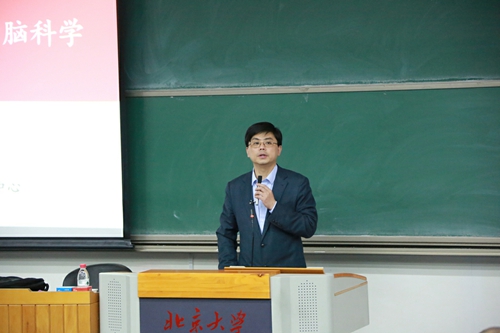Peking University, April 24, 2017: Human being’s brain, one of the most complicated systems in nature, is the key carrier of psychological and cognitive activities. To illustrate neural foundation of human’s brain’s cognitive functions is the bullet fist of human’s knowing nature and ourselves.
On April 24, 2017, Fang Fang, dean of School of Psychology and Cognitive Sciences, PKU, and director of Beijing Key Laboratory of Behavior and Mental Health, came to “Caizhai” Lecture and gave a speech on “Brain Sciences in the frame of Psychology and Cognitive Sciences”. He introduced the way to employ behavioral sciences, cerebral imaging technology and nerve regulation technology to measure, predict and control human’s psychological and cognitive process, and then presented research methods to human’s brains in the theoretical frame of psychological and cognitive sciences. Peking University Graduate School Vice President Jiang Guohua presided over and attended the lecture.

In the beginning, Fang Fang started with PKU’s research in the field of brain sciences to introduce definitions and goals in psychology. Psychology is a science that studies individual behaviors and mental process, aiming to describe, explain, predict and control behaviors and mental process. The early psychologist Sigmund Freud argues for psychodynamic theory that behaviors originate from inherited instincts and biological drive, try to resolve conflicts between individual demands and social requirement, and aim to reduce tension. While Abraham Maslow believes in the humanism, emphasizes on phenomena but not experiments. He deems that people are kindhearted essentially, and can improve themselves to play their creative potential as long as growing in proper environments and receiving fair education. In 1879, Wilhelm Wundt established the first psychological laboratory in Leipzig University, declaring the birth of scientific psychology. The first psychological laboratory in China was set up by Cai Yuanpei in Peking University in 1971. With the development of scientific psychology, those problems and phenomena considered as impossible to be tested by experiments, such as “how body senses and generates consciousness”, gradually becomes the object of research.
At present, human beings are facing four unresolved problems which are the origin of universe, the origin of human, the generation of consciousness and intelligence respectively. The goal of cognitive neurosciences is to explore the neural mechanism of cognitive and psychological process, namely how brain works to create psychological and cognitive functions. The settlement of the latter two problems relies on the development of cognitive neurosciences. In the first part of the lecture, Fang Fang concretely presented behavioral research system and the usage of eye tracker, magnetic resonance imaging, near infrared imaging, electroencephalograph, intracranial electrode, brain magnetometer, transcranial magnetic stimulation, transcranial electrical stimulation etc., in revealing the neural mechanisms of cognitive and psychological processes and the principle of accurate neural regulation.
In the second part of the lecture, Fang Fang respectively clarified the process to measure implicit mentality, how to predict learning, cognitive and social abilities, and how to convert social prejudice in the frame of psychological and cognitive sciences. Fang Fang explained, implicit mentality is concealed mental activities that can not be observed, measured and recorded directly by the outside world. Using multiple behavioral paradigms, for instance, eye tracker and electroencephalogram, researchers can measure testee’s implicit psychological features such as sex orientation and honesty without their awareness. Next, with the latest brain imaging research, Fang Fang showed that people’s various learning abilities including perceptual learning, foreign language learning, mathematics learning, word learning and motor skill learning can be detected from individual brain structures and functions. So can be predicted the individual intelligent development and emotion regulation ability. At last, Fang Fang illustrated that testee’s implicit altitude can be understood through implicit association test, through anti- prejudice training, individual’s prejudice towards the society can be corrected.
After the lecture, Fang Fang discussed with students over what is characteristic, whether consciousness equals to psychology, whether diligence is a gift and the possibility to predict one’s future problem through physiological index. The lecture ended with students’ applause.
Speaker introduction:
Professor Fang Fang, dean of School of Psychology and Cognitive Sciences, PKU, and director of Beijing Key Laboratory of Behavior and Mental Health, and standing vice president of McGovern Institute of Brain Research. He is the gainer of National Science Fund for Distinguished Young Scholars, Yangtze River Scholar Professor and editorial board member of various international journals such as “Current Biology”, “Experimental Brain Research”. He graduated from department of psychology, PKU in 1997, and got his master degree in school of information science and technology, PKU in 2001. In 2006, Fang Fang graduated from Department of Psychology, University of Minnesota and obtained Doctor of Philosophy. After 1-year postdoc in the same university, he began to work in Department of Psychology, PKU in 2007. His research field is to study visual awareness, consciousness, attention and their neural mechanisms. Professor Fang Fang has achieved the following awards and academic titles: China Youth Science and Technology Award (Organization Department of the CPC Central Committee, Ministry of human resources and social security, China Association for science and technology, 2011), Government special allowance (The State Council, 2014), Talents Project National candidates and the national young experts with outstanding contributions (Ministry of human resources and social security, 2015), Young Scientist Award (International Federation of Psychological Sciences, 2016), Leading Talents to Ten Thousand People Plan (Organization Department of the CPC Central Committee, Ministry of science and technology, 2016).
Written by: Zhang Jingwen
Edited by: Wang Chengsiou
